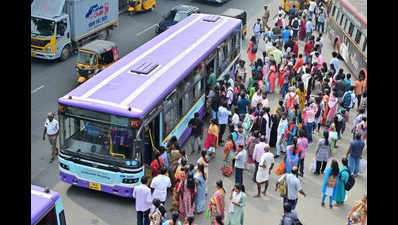MTC to add 600 buses, but needs 3,000 more | Chennai News – The Times of India

Chennai: For the first time in 15 years, Metropolitan Transport Corporation is set to expand its fleet with 600 electric buses next month. Another 650 buses will be added next year, taking the fleet size to nearly 4,500. But, that is still not enough as the Union urban affairs ministry recommends a city have 60 buses per lakh people. That would require MTC to have 7,200 totally.
Unlike conventional diesel buses, these low-floor electric buses, costing around 1.2 crore each, will operate under a gross cost contract model. Instead of purchasing them outright, MTC will bring in private operators, paying them a fixed rate per kilometre, while retaining fare collection revenue. The corporation has already started revamping depots, such as Chennai Central (Pallavan Salai), to set up charging infrastructure, with buses requiring four hours for a full charge.
The new buses will be deployed on key routes, including 19 (T Nagar-Thiruporur), 91 (Thiruvanmiyur-Tambaram), 570 (Kelambakkam-Koyambedu), and 21G (Broadway-Vandalur). This expansion will take the fleet size to nearly 4,500, yet experts note that over a third of the fleet will remain outdated. MTC struggled for years to replace aging buses.
In the past two years, though, 900 diesel buses were phased out, with another 500-600 set for replacement next year. “This will mark a shift where no further old buses need to be retired,” said former MTC managing director Alby John, who spearheaded the transition. He also ensured the hiring of 700 temporary drivers and 500 conductors to tackle chronic staff shortages that once left 300-500 buses idle daily.
“Even after this, many buses will continue to be in poor condition, making daily commutes difficult for half of the 31 lakh passengers,” said D Ramakrishnan, a resident-activist from Adambakkam. “From broken seats and inadequate ventilation to welded gear rods for drivers and damaged handrails, these old buses remain uncomfortable and unsafe for daily travel,” he added.
Tamil Nadu sought an extension from Centre to keep aging buses in service beyond the 15-year maximum lifespan, managing them with “unskilled” mechanics, said Santhapriyan Kamaraj from TNSTC Enthusiasts, a public transportation advocacy group.
Many of these older buses continue to be used as pink buses, on which women travel for free. “New buses should be deployed in ordinary services since the govt reimburses MTC 15 for every woman traveling free,” said transportation activist Valavan Amudhan. Instead, the newer buses are mostly assigned to express and deluxe services, which charge higher fares.
Meanwhile, another neglected area is Chennai’s small bus network, which plays a crucial role in first and last-mile connectivity. Of the 140 small buses, many remain parked at depots or are used as metro rail feeders, leaving commuters underserved. To address this, the govt started issuing licences for private operators to run mini-buses in key areas such as Alandur, Sholinganallur, Madhavaram, and Manali.
















